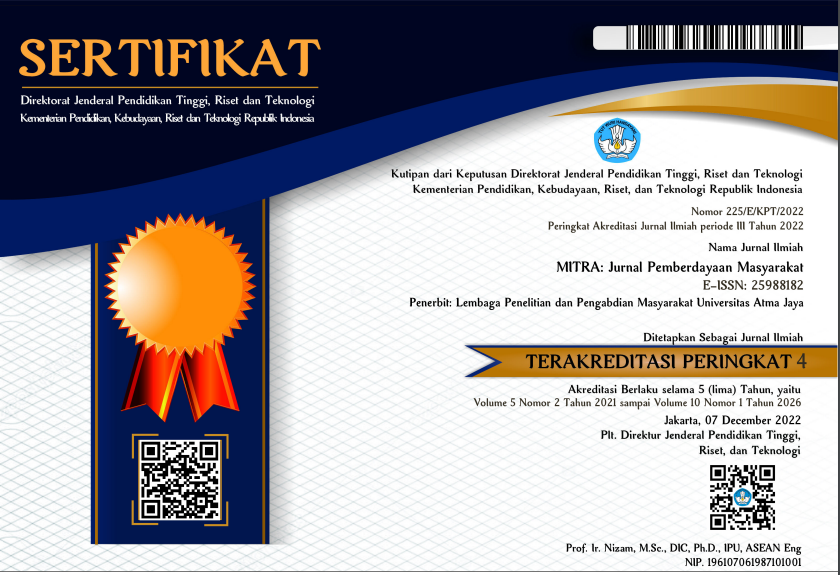The Psychological Development Program for Adolescents in PSAA Ceger and Tebet, Jakarta: A Needs Analysis
DOI:
https://doi.org/10.25170/mitra.v2i1.29Keywords:
self-efficacy, foster care, psychological development, caregivers, adolescentsAbstract
Panti Sosial Asuhan Anak (PSAA) Putra Utama 3 and 4 are units of DKI Jakarta Social Service that provide alternative foster care for adolescents. As substitute for parents, PSAA is responsible for fulfilling the needs of the foster kids. Unfortunately, the service provided is inadequate, both from the quantity and the quality of the caregivers. That is, even though the kids’ physical needs are met, their psychological needs are often neglected. As a result, problems emerge, including the feeling of apprehension about their future after leaving the orphanage, which were worsened by their poor social and academic ability. These problems seem to stem from low level of self-efficacy, namely one’s confidence in the ability in organizing and carrying out actions needed to attain certain result, which in this case is to be able to survive outside the orphanage. As a means of intervention, a psychological development program was planned. To ensure the program effectiveness, a need analysis was carried out. The result showed that the skills needed by the kids include understanding oneself, positive attitude, understanding one’s learning style, time management, self-discipline, communication, teamwork, and goal-setting. Similar to adolescents in general, the kids’ relationship with their significant others greatly affect their emotion and motivation. Meanwhile, their idea about their future was not yet concrete or focused. Different approaches to the boys and girls were applied in executing the program, although generally, the use of video and game effectively was able to catch their attention. In order for the intervention to be thorough, the program was also provided to the caregivers.
References
Borualogo, I. S. (2004). Hubungan antara persepsi tentang figur attachment dengan self esteem remaja Panti Asuhan Muhammadiyah. Jurnal Psikologi, 13, 29-49.
Lampiran Peraturan menteri sosial Republik Indonesia (Permensos RI) No. 30/HUK/2011 (2011). Diunduh dari http://dokhuk.kemsos.go.id/sisdok/index.php?p=show_detail&id=3123# pada 26 September 2017.
Papalia, D. E., Olds, S. W. & Feldman, R. D. (2011). Human development. New York: McGraw-Hill.
Rifai, N. (2015). Penyesuaian diri pada remaja yang tinggal di panti asuhan (Studi kasus pada remaja yang tinggal di Panti Asuhan Yatim Piatu Muhammadiyah Klaten) (Skripsi). Diakses dari Koleksi Karya Ilmiah Perpustakaan Universitas Muhammadiyah Surakarta. Diunduh dari http://eprints.ums.ac.id/37823/1/02.%20NASKAH%20PUBLIKASI.pdf pada 14 Juni 2017.
Santrock, J.W. (2011). Educational psychology (5th ed.). New York: McGraw-Hill.
Santrock, J.W. (2014). Adolescence (15th ed). New York: McGraw-Hill Education.
Kementerian Sosial Republik Indonesia. (n. d.). Panti Sosial Asuhan Anak (PSAA). Diunduh dari https://www.kemsos.go.id/content/panti-sosial-asuhan-anak-psaa pada 26 September 2017.
Downloads
Published
Issue
Section
License
This license allows reusers to distribute, remix, adapt, and build upon the material in any medium or format for noncommercial purposes only, and only so long as attribution is given to the creator. If you remix, adapt, or build upon the material, you must license the modified material under identical terms.



_.jpeg)

.png)
2.png)
.png)
.png)



